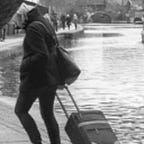Water Management on the Periphery of Medellin, Colombia
Caroline Knowles
Marita stomps into the meeting at the community centre in Bello Oriente in pattered wellies. She is flushed from the climb and from arguing with city authorities over the closure of the school. The school needs repairs. The landowner won’t do them because he only owns the land, not the school. The city authority owns the school but refuses to pay for repairs to a building on land they don’t own. These are some of the entanglements of land tenure on Medellin’s steep periphery, where hundreds of thousands of the city’s low income population live in narrow winding streets of ramshackle self-built houses and rigged together businesses: built expressions of survival improvised one day at a time. Bello Oriente is where city meets countryside: precisely where Medellin, like other cities in Colombia, and indeed across Latin America, is growing most rapidly.
This meeting is about water, not school. Marita settles down with her daughter. A middle- aged man wanders in, slamming a jar of water with brown bits floating in it onto the table with one hand, holding his water bill in the other, ready to do battle with the utility company, Empresas Públicas de Medellín (EPM). EPM’s rebuttal is swift. Households without a connection to the pipe are tapping into it to steal water, contaminating it in the process. Isn’t this a legal matter? The community question whether water should be sold anyway. Isn’t it a human right, not a commodity? EPM fights back: they are not charging for water but to build the infrastructure carrying it. Even so, must it be paid for by user fees? The community is savvy — struggles like this define it. It is resilient too. For decades Medellin was a global by-word for urban violence as drug routes and territories were fought over, and guerrillas (FARC and ELN) and state-backed paramilitaries did battle in the streets, shaping the lives of those who live there because they don’t have better options.
Clean water is in short supply. Until it rains. Then it causes landslides that sweep through the houses and businesses, precariously perched on the steep slopes of Bello Oriente and other informal peripheral communities. The pipe might bring water, but it does nothing to stop the landslides, and the rains are increasing with climate change. Fresh eyes and new solutions are needed. The community is up for it. Two of the local universities are on side. Universidad Nacional de Colombia, and the Universidad de Antioquia are partnered with a research team based at the University of Edinburgh, where Soledad Garcia-Ferrari leads a multi-disciplinary research team to work with the community and develop an acceptable prototype to capture and store rainwater, both to allow communities access to water but also to contribute to an integrated approach to landslide risk management. The research is funded by the British Academy under its Global Challenges Research Fund Urban Infrastructures of Well-Being Programme[i].
The research team’s water and risk surveys, GIS mapping of irrigation, water flows and past floods, are complemented by community interviews and participative workshops in which local knowledge and aspirations are exchanged. Having considered alternatives, the project is aiming for rainwater harvesting from rooftop gutters, to be collected in plastic barrels, which can be filtered for domestic use, leaving unfiltered water for cleaning and agriculture, etc. Although it is only a prototype, this can be scaled up and rolled out in other informal communities too. The system will also become a component of a comprehensive landslide risk management strategy at the neighbourhood level, based on managing water and building on local climate change scenarios.
The research has consolidated relationships with city authorities responsible for mitigating risks, the Disaster Risk Management Department (DAGRD), who have approached the team for help in developing an ‘Integrated Disaster Risk Management Plan’ for the North-East city border region. This plan would extend a range of services to both mitigate and deal with disasters such as flooding, landslides, and earthquakes as they occur. Meanwhile, communities are beginning to understand the impact climate change might have on their lives.
EPM are keen to partner with the project too. They know that the pipe must be replaced, but it won’t be ready until 2024. Meanwhile, finding a viable low-cost water solution is more urgent than that — people are unhappy with the quality of their water and the risk of disease. The research team’s prototype could be a solution at the community or individual household level. And their data, which delicately takes a sounding of community thinking, could be useful to EPM, who need to understand people as well as pipes.
[i] Exploring the development and implementation of co-produced water management infrastructure solutions to adapt to climate change-related risk: the intersection of rural- urban areas in Medellin. The research sites are in the peri-urban area of North East Medellin, in Bello Oriente and San Jose la Cima — both in Comuna 3 — and El Faro in Comuna 8, which comprises approximately 6000 dwellings on a rapidly expanding urban edge
Caroline Knowles is the Director of the British Academy’s Global Challenges Research Fund (GCRF) Urban Infrastructures of Well-Being Programme and a Global Professorial Fellow at Queen Mary, University of London. An urban Sociologist with research experience in a number of cities, she is the author of many books and papers, most recently, Flip-Flop: A Journey through Globalisation’s Backroads, published by Pluto Press (2014 & 2015) www.flipfloptrail.com and Serious Money: Walking Plutocratic London, published by Penguin (2022) https://seriousmoneybook.com
